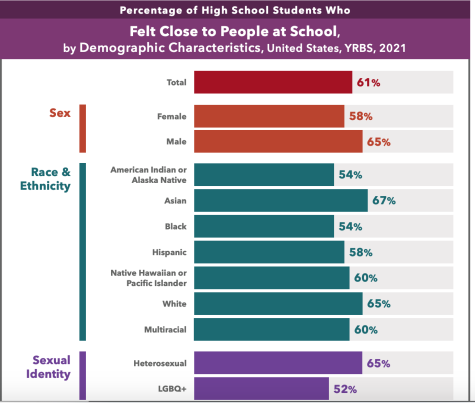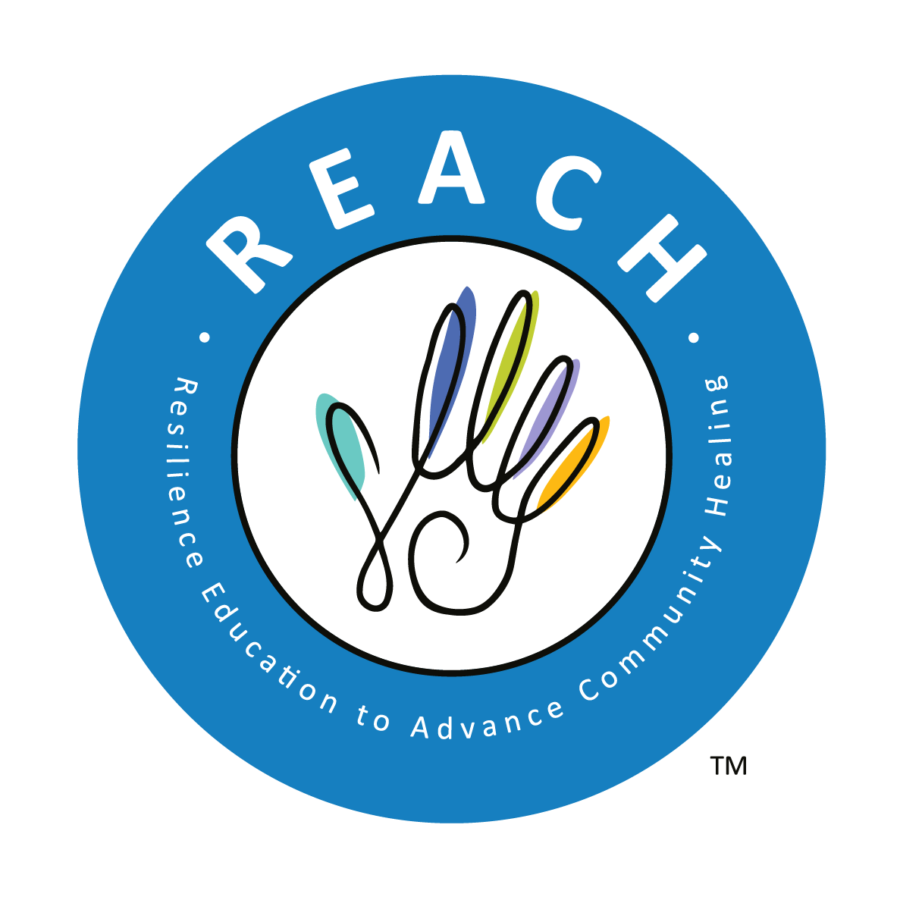Illinois teens are struggling, yet REACH provides support to local schools
Photo courtesy of Center for Childhood Resilience
REACH provides free, online resources to help teens and adults handle mental health issues. May is Mental Health Awareness Month.
May 15, 2023
Mental Health Awareness Month – recognized in May each year – was started by the Mental Health America Organization in 1949. Nearly 75 years after its founding, it might be needed now more than ever.
While the COVID-19 pandemic has disrupted lives of all ages, data shows it disproportionately affected teens. 42% of high school teens reported “persistent feelings of sadness or hopelessness” in 2021 compared to just 28% in 2011. Among high schoolers, 60% of females and 70% of LGBTQ+ students reported these same feelings.
“Many of the personal actions used to stay mentally healthy were restricted or coping strategies to self-manage mental challenges during the pandemic were not available,” said Matt Buckman, executive director of the Stress and Trauma Treatment Center and REACH partner. “Some strategies that were unintentionally restricted included relationship time, quality, and frequency that included a wide range of encounters from seeing friends at school to attending a family gathering.”
Despite the prevalence of mental health issues among teens, only about 51% of US children and teens receive mental health treatment. Professional care can be difficult to access due to the generalized stigma around mental health as well as the cost of treatment. Because of this, many students resort to resources at their school to seek support.
In fact, of the 51% of US children and teens who receive mental health treatment, 58% of them receive these services in schools. As teen mental health rates continue to trend in a downward spiral, schools in Illinois, including LFHS, are striving toward becoming more supportive spaces for all their students by providing services such as psychologists and counselors as well as fostering a more positive environment in general.
According to the CDC, “school connectedness” – defined as the percentage of students agreeing they feel close to others at their school – is a vital component of teens’ mental health. While 61% of students agreed they felt close to others, there are disparities when evaluating this same category among specific groups of students.
LGBTQ+ students are 13% less likely to feel connected to their peers at school compared to their heterosexual peers, a likely factor in the especially high percentage of mental health struggles among LGBTQ+ teens.
These teens are no strangers to harassment at school, as just a few short weeks ago an LGBTQ+ support group room was intruded on by another group of students at LFHS. Instances such as these demonstrate the importance of schools striving to be a more supportive place for all students.

In 2018, the Center for Childhood Resilience at Lurie Childrens Hospital in Chicago partnered with the Stress and Trauma Treatment Center of Southern Illinois to form a pilot program that would eventually become known as REACH (The Resilience Education to Advance Community Healing.)
“Our results [from the pilot year] found that both sites found significant improvement in their self-assessed level of need identified by the Trauma Responsive Schools Implementation Assessment (TRSIA) showing less need across domain areas,” said Buckman.
REACH earned its title as an official initiative a year later and now has hundreds of participating schools across the state. Today, the goal of REACH is to provide resources and education to teachers, faculty, and community members informing them on how to form a “trauma-responsive” school.
“A trauma-responsive school is one that proactively implements policies, procedures and practices that embody key components of trauma-informed care,” said Caryn Curry, Mental Health Consultant at the Center for Childhood Resilience. “Those components include providing a safe environment for all, promoting healthy relationships and connectedness, and teaching and promoting emotion regulation, which includes healthy expression of all emotions.”
By becoming a part of the REACH program, a school agrees to form a team of five members who will commit to working with the initiative. The team is composed of a school administrator, a mental health lead, a community partner, a teacher lead, and a family representative.
“A REACH school is a school interested in learning and doing something to improve the responsiveness to trauma and grow resiliency,” said Buckman. “Although needs and action steps will be different for every school, all schools are building a team to identify a need and make a change to improve the school for students and staff that have experienced trauma.”
By being a part of the REACH team, members participate in learning sessions and complete an assessment measuring trauma responsiveness in their respective schools. Based on the results of this survey, the team then works with their local Social Emotional Learning Hub (SEL) to create a plan of action to improve a school’s ability to be a trauma-responsive school.
The SEL Hub for Lake Forest High School is located in Vernon Hills at the Lake County Regional Office of Education. Lake Forest High School works directly with this SEL hub when developing a plan of action to create a school environment that is responsive to varying mental health issues.
“There are many benefits of REACH which include improved school climate through trauma-responsive policies and practices, stronger teacher-student relationships, and school-family partnerships,” said Monique Belin, SEL/Equity, Diversity, and Inclusion Coordinator at the Lake County SEL Hub.
When a school recognizes certain areas of focus, the team works directly with REACH to implement effective strategies for creating a more supportive school climate. One of the most significant areas of focus is “staff self-care” according to Buckman, and was also the area that improved the most once identified. Even though REACH is targeted towards teens, teachers and faculty have supported it as well.
“Schools that are involved with REACH have a wonderful opportunity to create environments that support the social, emotional and mental well-being of all students by embedding trauma-responsive policies and practices into their culture and climate,” said Curry. “When schools are safe emotionally and physically, students are supported to develop healthy relationships and connectedness, and learn how to fully express themselves in healthy ways, they have a greater opportunity to thrive and be successful in school.”
Although many schools are aware of the teen mental health crisis, it can be difficult to craft an effective response.
“Nearly 50% of America’s children experience at least one adverse childhood experience so in order to provide them with the necessary support our schools need to become more trauma-informed,” said Belin. “Through REACH we are able to provide schools with the guidance to translate this term into concrete strategies.”
Illinois passed a bill in 2021 allowing elementary-aged and high school students five mental health days per school year. If a student should choose to take a mental health day, they are not required to provide a doctor’s note for their absence and are allowed to make up all their missed work.
This bill was passed shortly after the pandemic, a sign that while the pandemic took a toll on teens’ mental health, it also brought light to these struggles, leading to legislation to address the issue.
“The Center for Disease Control and Prevention reports that there is a crisis in teen mental health that began prior to the pandemic, but [the mental health awareness movement] has both grown and received greater awareness since COVID,” said Curry.
The protection of mental health days in school combined with initiatives such as REACH provides a sense of hope and support to teens in the midst of a mental health crisis.
The events of Mental Health Awareness Month will come to a close in the coming weeks, but REACH will continue to provide support to struggling youth: a reminder that it is okay to not be okay.
This story was originally published on The Forest Scout on May 11, 2023.




































